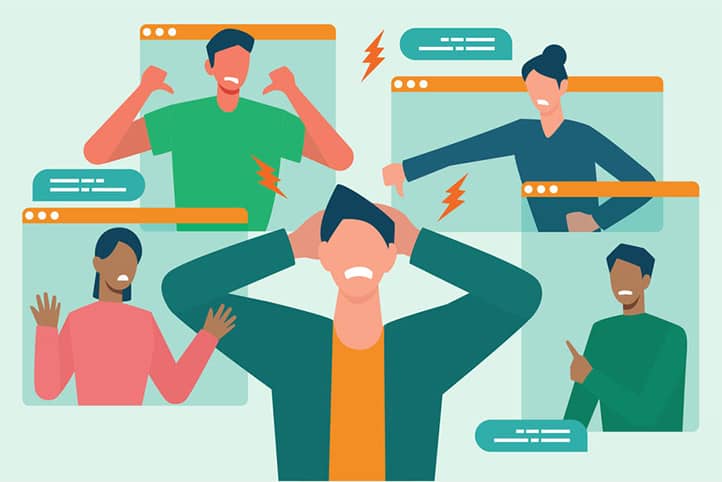Trolling is a form of provocative behavior typically manifested online through posts, comments, statements, or actions aimed at eliciting an emotional reaction from others. A key feature of trolling is the deliberate intent to provoke irritation, anger, or other emotional discomfort in others. Trolling is often disguised as humor or sarcasm; however, its main goal is not constructive interaction but creating tension in communication.
The word “trolling” in English initially referred to a fishing technique where an angler slowly drags a lure behind a boat to provoke a fish to strike. This image resonates with the concept of “baiting” to provoke an emotional response in people, which is the essence of internet trolling.
There is also a theory that the word is associated with Scandinavian trolls — mythical creatures often portrayed as hostile, foolish, or cunning. In the internet context, this parallels the behavior of people acting harmfully.
The term began gaining traction in Usenet communities (network forums of the 1980s and 1990s). “Trolling for responses” referred to “throwing out provocative or silly remarks” to provoke a reply. Initially, the term did not carry such a negative connotation but eventually came to mean deliberate provocation and manipulation of other discussion participants.
Today, trolling is an integral part of online communication. With the rise of social networks and platforms where people can freely express their opinions, trolling has become widespread. Its influence is felt in various areas — from personal communication to political and social discussions.
The relevance of studying trolling stems from the increasing number of cases of cyberbullying, psychological pressure, and manipulations that negatively impact the mental health of online community members. Moreover, trolling highlights certain shifts in social behavior and communication culture in the digital era.
Trolling has deep psychological roots tied to both the behavior of the perpetrators and the reactions of their victims. Its study offers insights into:
- Trolls’ motives. Individuals who engage in trolling often have various psychological motives: self-affirmation, seeking attention, expressing aggression, or even coping with personal psychological problems. Researching their behavior helps better understand the nature of human aggression.
- Impact on victims. The psychological effects of trolling can be severe, ranging from stress and anxiety to reduced self-esteem and the development of depression. Studying this impact aids in developing methods of psychological support for those affected by trolling.
- Social dynamics. Trolling affects group communication, provoking conflicts or even polarization. Studying these processes is crucial for understanding the modern culture of interaction.
- Anonymity and morality. The internet creates an environment where trolling thrives due to anonymity. This raises questions about how changing circumstances affect moral norms and the boundaries of social acceptability.
Psychological analysis of trolling helps not only to understand this phenomenon better but also to find effective approaches to minimizing it, creating safer conditions for online communication.

Historical Context of Trolling
Trolling as a phenomenon has deep roots in human culture. Although today it is most often associated with internet communication, its elements existed long before the advent of digital technologies. Provocative behavior, intentional deception, or eliciting emotional reactions have been part of human interaction across different eras. Modern trolling can be seen as an adaptation of these practices to the new conditions of the digital age.
With the development of the internet, trolling has taken on new forms and scales. While in the past, provocations had limited use, today they have become accessible to millions of people simultaneously. This has changed both the mechanisms and consequences of trolling, making its impact more profound and enduring.
Origins of Trolling in Culture and Communication
Trolling can be traced back to ancient cultures, where provocations were used as rhetorical techniques. In Greek discussions, sophists often resorted to paradoxical statements to confuse opponents and demonstrate intellectual superiority. In the Middle Ages, similar practices appeared in the form of satire, parody, or riddles that could humiliate or place someone in an awkward position.
In literature, there are also examples of behavior akin to trolling. Characters in the comedies of Shakespeare or Molière often used sarcasm and wit to provoke others. These examples indicate that trolling, although unnamed, was part of cultural life aimed at emotional provocation or entertainment.
How Has the Internet Transformed Trolling into a New Form?
The internet has created an ideal environment for the proliferation of trolling. Anonymity and the speed of communication have greatly facilitated the ability to provoke others without real consequences for the provocateur. Forums, social networks, and platforms have emerged, allowing trolls to experiment with their behavior.
New technologies have added elements of mass influence to trolling. Whereas provocations were previously directed at a limited group of individuals, today they can affect thousands or even millions simultaneously. Moreover, the popularity of memes, jokes, and viral content has allowed trolling to become a form of self-expression or even a tool for influencing public opinion.
Comparing Modern Trolling with Ancient Forms of Provocation
The main difference between past and present trolling lies in scale and technological foundations. In the past, trolling was a local phenomenon dependent on live communication. These were individual or group provocations often confined to a specific community or cultural context.
Modern trolling, by contrast, is global. The internet allows trolls to act without geographical or cultural constraints. Motivation has also changed: while trolling in the past might have been aimed at entertainment or education, today it often serves as manipulation or even information warfare.
Despite this, both forms share common features: the desire for emotional impact, the use of humor or sarcasm, and the intent to provoke a reaction. This confirms that trolling is not just a modern phenomenon but also an occurrence deeply rooted in the history of human interaction.

Psychological Aspects of Trolling
Trolling, despite its apparent frivolity, is a complex psychological phenomenon reflecting the interplay of personal, social, and technological factors. Studying this phenomenon allows us not only to understand the behavior of trolls but also to comprehend deeper processes occurring in the minds of both provocateurs and their victims.
From a psychological perspective, trolling often mirrors internal conflicts of individuals that manifest in the virtual space. Anonymity and the absence of immediate consequences create a favorable environment for behaviors that might otherwise be restrained by social norms in real life.
The psychological aspects of trolling encompass a wide range of issues, from the motives driving provocative behavior to the role of anonymity in online communication. Understanding these aspects helps shed light on both individual behaviors and the dynamics of modern digital interactions.
Motives for Trolling: From Entertainment to Manipulation
Trolls may have various motives, which can be roughly categorized as follows:
- Entertainment and self-expression. For many trolls, provocative behavior serves as a form of entertainment or self-assertion. They enjoy eliciting reactions from others, treating trolling as a game that brings satisfaction.
- Desire for influence. Some trolls aim to manipulate others’ thoughts or emotions to assert dominance or provoke specific reactions. This may include attempts to polarize audiences or control the flow of discussions.
- Aggression outlet. For some individuals, trolling is a way to release negative emotions or aggression that they cannot express in real life.
- Social experimentation. Some trolls justify their actions as a desire to test people’s reactions or study group dynamics under unusual conditions.
Internal Conflicts and Personal Issues of Trolls
Trolls’ behavior is often tied to their internal state. Common psychological factors influencing a tendency to troll include:
- Low self-esteem. Trolling may serve as a way to compensate for insecurity by drawing attention through provocative actions.
- Attention-seeking. Individuals who lack attention in real life may seek it in virtual spaces, even if the attention is negative.
- Frustration and stress. Trolling can act as a way to relieve tension caused by life problems or conflicts.
- Tendency toward deviant behavior. In some cases, trolling reflects deeper personal issues, such as narcissism, psychopathy, or a lack of empathy.
The Role of Anonymity in Online Communication
Anonymity is a key factor fueling the growth of trolling on the internet. It provides individuals with a sense of safety, creating the illusion that their actions will have no real consequences.
- Reduced social control. Anonymity allows individuals to ignore norms that regulate real-life behavior. They may act without regard for moral or ethical standards.
- Increased boldness. People who usually avoid conflict or provocations may feel more confident in an anonymous environment.
- Identity alteration. Trolls often create alternative online personas, enabling them to separate their virtual actions from real life.
- Lack of accountability. Online platforms rarely penalize trolling, further encouraging this behavior.

Trolling and Social Interaction
Trolling is not only an individual behavior but also a phenomenon that significantly impacts social dynamics in the online space. It changes the nature of interaction between people, creates challenges for group communication, and raises questions about the psychological consequences for both victims and society as a whole.
On one hand, trolling disrupts harmonious communication, provoking conflicts and destabilizing communities. On the other hand, it reveals hidden aspects of human behavior and emotions, offering insights into the mechanisms of social interaction. Examining trolling from this perspective helps uncover its impact on groups, the psychological reactions it elicits in victims, and whether it is possible to overcome the culture of aggression in the digital space.
How Trolling Affects Group Dynamics?
Trolling in group communications often has a destructive nature. It can influence group dynamics in several ways:
- Community destabilization. Provocative actions by trolls disrupt harmony within groups, diverting participants from the main topic of discussion. This can lead to a loss of interest in participation or even the disintegration of the community.
- Polarization of opinions. Trolls often use confrontational topics to provoke participants into conflict. This exacerbates tensions and divides the group into opposing factions.
- Increased distrust. Persistent trolling can foster distrust among group members, complicating the establishment of open and constructive relationships.
- Adaptation of group rules. Some communities start changing their rules or moderation practices to protect themselves from trolls, which can also restrict freedom of expression.
Psychological Mechanisms of Trolling Victims
Victims of trolling often experience a wide range of negative emotions that can affect their psychological state:
- Emotional discomfort. Trolling frequently elicits feelings of offense, anger, fear, or humiliation, reducing victims’ self-esteem.
- Social isolation. Those targeted by trolls may avoid participating in open discussions to prevent further attacks.
- Traumatization. In severe cases, trolling can lead to lasting psychological trauma, including anxiety or depression.
In response to trolling, victims adopt various strategies:
- Ignoring. This is the most common tactic, though it is not always effective as trolls may escalate their activity.
- Seeking support. Victims often turn to friends or community moderators for help.
- Active resistance. Some individuals attempt to confront trolls, which can sometimes worsen the situation.
Online Culture of Aggression: Is There a Way Out?
The culture of aggression on the internet is one of the biggest challenges of the modern digital space. While anonymity and lack of control contribute to its prevalence, there are ways to mitigate its impact:
- Enhanced moderation. Implementing clear rules and active moderation of discussions can reduce the incidence of trolling.
- User education. Teaching individuals effective communication and self-defense strategies can diminish the impact of aggressive behavior.
- Social initiatives. Campaigns against online aggression promote a positive environment for communication.
- Technological advancements. Using artificial intelligence to automatically detect trolling can help prevent aggressive actions in real-time.
Overcoming the culture of online aggression is a challenge for society, but focused efforts can make the virtual space safer and more conducive to communication.

Positive and Negative Aspects of Trolling
Trolling is a complex and multifaceted phenomenon that can have both positive and negative sides. Its manifestations range from innocent humor to outright destructive behavior that harms individuals and communities. Despite the common perception of trolling as an exclusively negative phenomenon, some forms of it can draw attention to important social issues or stimulate discussions. At the same time, the negative impact of trolling often dominates, especially when it crosses the line between humor and aggression, destroying psychological comfort and creating conflicts.
Examining the positive and negative aspects of trolling allows for a deeper understanding of its impact on society and the ethical boundaries that should be considered. In this context, it is important to distinguish between constructive and destructive trolling, focusing on motives and consequences.
Can Trolling Be Beneficial?
Despite its ambiguity, trolling can perform certain positive functions:
- Drawing attention to important issues. Some trolls use provocative statements to initiate discussions on social, political, or environmental problems. For example, ironic or sarcastic comments about global warming might encourage people to think about this topic.
- Testing social reactions. Trolling sometimes allows for examining how society responds to certain ideas or situations, which can be useful in studying public sentiments.
- Relieving tension. In some cases, good-natured trolling helps ease tension in discussions, giving them a humorous tone.
However, these positive aspects are realized only if ethical boundaries are respected and there is no intention to cause harm.
Disruption of Psychological Comfort: Risks of Trolling
Negative trolling has serious consequences for people’s psychological state and social relationships:
- Emotional harm. Trolling can cause victims to feel fear, anxiety, humiliation, or anger, leading to decreased self-esteem and a loss of trust in others.
- Conflict escalation. Aggressive trolling can provoke interpersonal and group conflicts, which may extend beyond the internet and affect real life.
- Degradation of discussion quality. Frequent trolling reduces the constructiveness of communication, turning discussions into a collection of insults and provocations.
- Psychological trauma. In severe cases, especially during cyberbullying, trolling can leave deep emotional scars requiring long-term psychotherapy.
Negative trolling most often occurs in situations where the goal is not discussion or humor but deliberate harm.
The Ethical Boundary Between Humor and Harm
Trolling as a form of communication requires clear ethical boundaries that distinguish acceptable humor from destructive behavior:
- Understanding context. Humor that might seem harmless in one context can be perceived as offensive in another. For example, a sarcastic comment in a discussion about social issues might provoke both laughter and outrage.
- Intent and consequences. The key element is the purpose of trolling. If aimed at entertainment or discussion, it may be perceived positively. However, if the primary goal is humiliation or manipulation, it crosses an ethical line.
- Subjective perception. Humor often depends on individual characteristics, and what one person finds funny may offend another. This makes defining boundaries challenging.
Ethical trolling is possible only when there is an awareness of its impact and respect for the emotions and rights of others. A culture of constructive communication requires individuals to consider these aspects before engaging in trolling.

Trolling as a Modern Phenomenon
Initially emerging as innocent humor or provocation, trolling has transformed into a large-scale social phenomenon in the modern world. Its popularity has skyrocketed in recent decades, largely due to the development of the internet and social media. At the same time, profound changes in society, such as the increase in information flow, anonymity, and social tension, have created ideal conditions for trolling. It has become not just a form of entertainment but a means of communication, a tool of influence, and even a manifestation of aggression in the digital environment.
Why Has Trolling Become Popular Now?
The popularity of trolling is largely due to contemporary realities that create an environment conducive to this type of behavior:
- The information age. The modern world is saturated with information, and trolling is often used to stand out against its backdrop. Provocative comments, jokes, or conflicts attract attention and serve as a kind of self-expression strategy.
- Social tension. Economic instability, political crises, and global challenges create high levels of stress in society. In such conditions, trolling becomes a way to vent emotions or escape real problems.
- The culture of entertainment. Modern society values instant humor and entertainment that is easy to consume. Trolling, with its quick and often ironic responses, fits perfectly into this culture.
Thus, trolling has become not only a way to attract attention but also a reflection of general trends in the modern world.
The Role of Social Media in the Spread of Trolling
Social media has become the main environment for trolling due to its unique features:
- Instant access to an audience. Social platforms allow users to share their opinions with a large audience at the click of a button, encouraging trolls to be active.
- Anonymity and lack of consequences. Many platforms allow users to remain anonymous, reducing their sense of responsibility for their words.
- Popularity algorithms. Provocative content often gets more views, likes, and comments because it elicits an emotional response. This makes trolling a profitable tool for increasing visibility on social media.
- Openness to manipulation. Social networks allow for the manipulation of audience emotions through provocative statements, making trolling popular among certain groups.
Social media not only promotes the spread of trolling but also creates an environment where its impact becomes most visible.
How Societal Changes Promote the Growth of Trolling?
Modern society has undergone significant transformations that directly influence the popularity of trolling:
- Changes in communication models. In the digital age, communication increasingly takes place online, where interactions lack nonverbal cues, and anonymity weakens social constraints. This allows people to express provocative or aggressive thoughts without fear of immediate consequences.
- The internet as a foundation of daily life. The increasing amount of time spent online makes the digital environment the main space for social interaction. Trolling is often seen as part of online culture.
- Erosion of ethical standards. Internet audiences often treat ethical norms lightly, creating favorable conditions for trolling.
- Increasing polarization. Differences in opinions on political, social, and cultural issues provoke conflicts that often manifest as trolling.
Societal changes not only influence the spread of trolling but also shape its modern manifestations, which increasingly reflect current challenges and public sentiments.

Methods to Combat Trolling
Trolling, while seemingly an integral part of modern online environments, is not a problem without solutions. Effective countermeasures require a comprehensive approach that includes support for victims, technological solutions, legislative initiatives, and the formation of new social norms in digital spaces. Given that trolling affects both individuals’ psychological well-being and the overall atmosphere of communication, strategies must combine individual and collective actions.
One of the key challenges is underestimating the impact of trolling, which is often dismissed as a “harmless joke” or a “feature of internet culture.” Yet, its consequences can be severe, including emotional exhaustion, reduced self-esteem, and even social isolation. Thus, combating trolling should be grounded in understanding its psychological nature, technical aspects, and societal implications.
Psychological Recommendations for Victims of Trolling
Victims of trolling often face emotional stress that can lead to serious psychological consequences. To mitigate its impact, the following recommendations should be considered:
- Ignoring provocations. Trolls thrive on reactions, so the most effective countermeasure is to refrain from responding to their comments. If a response is necessary, it should be neutral and emotionless.
- Seeking support from loved ones. It is important not to isolate oneself and to share feelings with friends, family, or a psychologist.
- Understanding the motivations of trolls. Recognizing that trolls often have their own internal conflicts or seek attention can help victims not take their words personally.
- Stress management practices. Activities such as meditation, physical exercise, and emotional regulation help reduce stress and restore inner balance.
Emotional support and a mindful approach to the situation can lessen the impact of trolling and strengthen psychological resilience.
Platforms, Moderation, and the Role of Legislation
Technical and legal tools play a crucial role in combating trolling:
- Content moderation. Many platforms implement algorithms and manual moderation to block offensive comments. For example, features such as prohibited word filters or the ability to report users.
- Blocking and reporting. Social networks allow users to block trolls and report their behavior to administrators, enabling quick responses to violations.
- Legislative initiatives. In some countries, laws are enacted to penalize cyberbullying and hate speech. Such measures motivate users to refrain from aggressive behavior.
- Educational campaigns. Raising awareness about ethical norms of online behavior can reduce the incidence of trolling.
A combination of measures, including effective moderation, technological solutions, and clear legislation, helps create a safer environment for online communication.
How to Foster a Culture of Healthy Online Communication?
Building a culture of healthy communication is key to overcoming trolling in the long term:
- Education on digital ethics. Teaching users the basics of mutual respect and ethical communication online can significantly reduce conflict levels.
- Promoting positive examples. Sharing success stories where discussions were constructive can serve as a model for others.
- Engaging opinion leaders. Public figures and influencers can impact audiences by demonstrating a culture of constructive dialogue.
- Advocating empathy. Developing a habit of understanding others’ perspectives in discussions will contribute to reducing aggression.
Effective trolling prevention requires a holistic approach that addresses psychological, technical, and social aspects. Implementing recommendations for victims, strengthening moderation, enforcing legal norms, and fostering a culture of healthy communication are key elements in overcoming this phenomenon.

Conclusion
Trolling remains an ambiguous phenomenon deeply rooted in modern digital society. It reflects not only technical capabilities and the specifics of online communication but also fundamental traits of human nature—the need for attention, the desire to influence others, and the urge to feel in control of situations. Despite the novelty of its form, trolling as a concept has a long history, as provocative behavior, emotional manipulation, and shock value have always been part of human interactions. This raises the question: is trolling purely a problem of the modern era, or has it merely taken on new traits in the digital age?
Completely eradicating trolling seems unlikely, as it stems from universal human motives that are difficult to fully control or eliminate. However, reducing its impact and creating a healthier environment for online communication are achievable goals. It is crucial to recognize that combating trolling is not solely a matter of technology or law but a challenge for every user. Personal responsibility for one’s actions and words online can be a decisive step in reducing aggression and negativity in the digital space.
A call for conscious online communication is central to addressing this issue. Developing empathy, the ability to understand others’ emotions, and awareness of the consequences of one’s actions can significantly improve the atmosphere of digital interactions. Promoting a culture of mutual respect and constructive dialogue, supporting positive behavior examples, and educating on ethical norms in the digital space should become priorities. Only through collective efforts by society, platforms, and individuals can we achieve harmony between freedom of expression and ethical conduct.
Thus, trolling is both a challenge and an opportunity to rethink the rules of interaction on the internet. It presents a chance to build not just a technologically advanced but also an emotionally healthy online environment where everyone can feel safe and comfortable.




